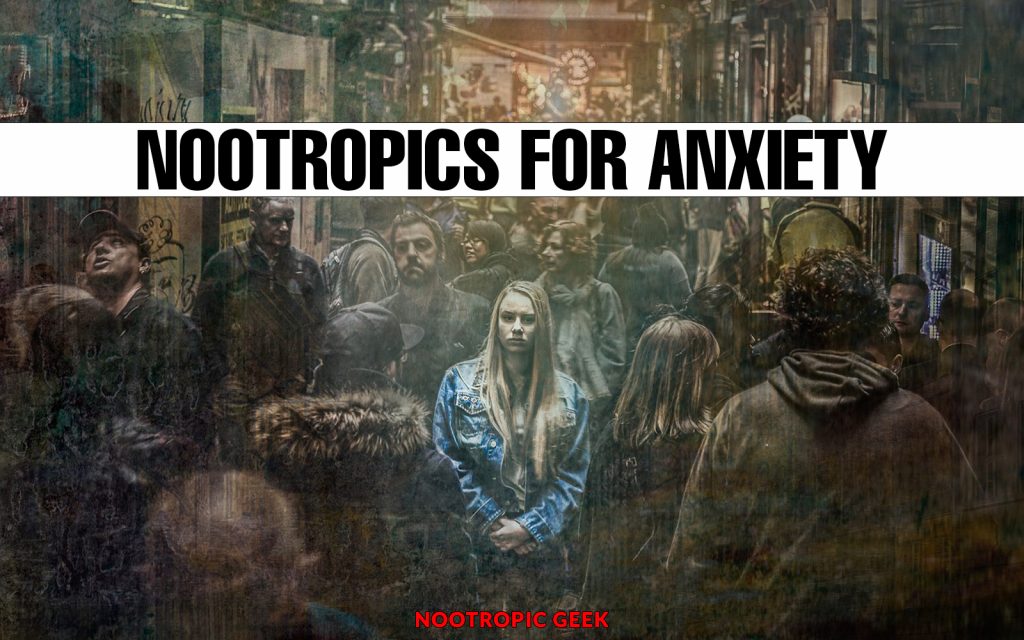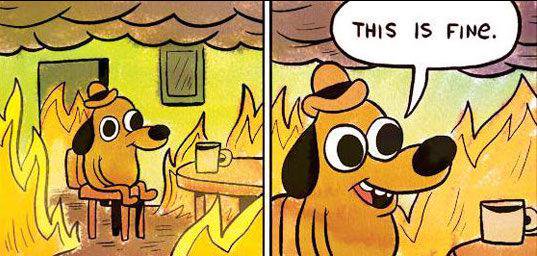Nootropics for Anxiety: Summary
The TL;DR Version: Everyone experiences various degrees of anxiety and stress on a daily basis, and nootropics may help alleviate the general, mild forms of anxiety–minus the sedative side effects typically associated with anxiolytics. In other words, these nootropics may help eliminate the stress (anxiety, worry) and keep the rest (energy, motivation)!
Hop onto /r/Nootropics subreddit and you’ll find many iterations of the question: what are the best nootropics for anxiety? People are simply losing their minds these days, and who can blame them?
There are plenty of things to worry about in life, so I do my best to prioritize the life-threats from the inconveniences, and, frankly, most life-threats are just a form of inconvenience when you really get down to it. Or maybe I just need to revise my anti-anxiety prescription: I probably should be at least somewhat worried about these things, right?
Of course, not all anxiety is bad, and, considering the opposite extreme–complete apathy–it may even be necessary to your survival. Fortunately, there are many nootropics that are effective at reducing anxiety while maintaining your motivation to live.
And there’s nothing else in the world I’d rather be doing than to tell you about them.
Page Contents
The Ultimate Nootropic Guide on Anxiety
There’s clinical anxiety and there’s just… anxiety.
And unless you’re experiencing severe spontaneous irrational bouts of compulsive nervousness and/or panic attacks, odds are your anxiety pertains to the latter form of anxiety: The 8 Mile Anxiety–as I like to call it.
It’s a rational form of anxiety: You’re about to take a seemingly life-affecting test. You’ve strangely been invited to a party full of real people. You’re a white rapper trying to figure out what the hell you’re going to rap about moments before taking the stage at a shady underground venue.
Naturally, in all of these cases, you’re going to feel at least a little stressed.
Sometimes you feel anxious and stressed for seemingly no reason, but after a few minutes of meditative self-reflection you find that reason. On the other hand, avoiding that self-reflection threatens to build and build the anxiety, leading to poor performance or avoidance of performing altogether, spiking more and more anxiety down the road.
Anxiety left unchecked may create a vicious downward spiral of negative psychological-behavioral causes-and-effects.
Now, when I describe 8 Mile Anxiety as “debilitating” in this sense, I don’t mean to conflate it with the aforementioned clinical anxiety: the state of stress and panic that is truly spontaneous and irrational, spurned by various pathological factors.
Both the rational and irrational states of anxiety may benefit by supplementing nootropics, however the clinical case deserves clinical attention. I’m not a doctor and this article isn’t intended to prescribe anything. As such, I’m going to speak of anxiety in general terms, starting with one of the general causes of anxiety–as it pertains to nootropic intervention.
Related:
Ashwagandha and Adderall: Are They Safe to Mix?
GABA Deficiency in the Brain
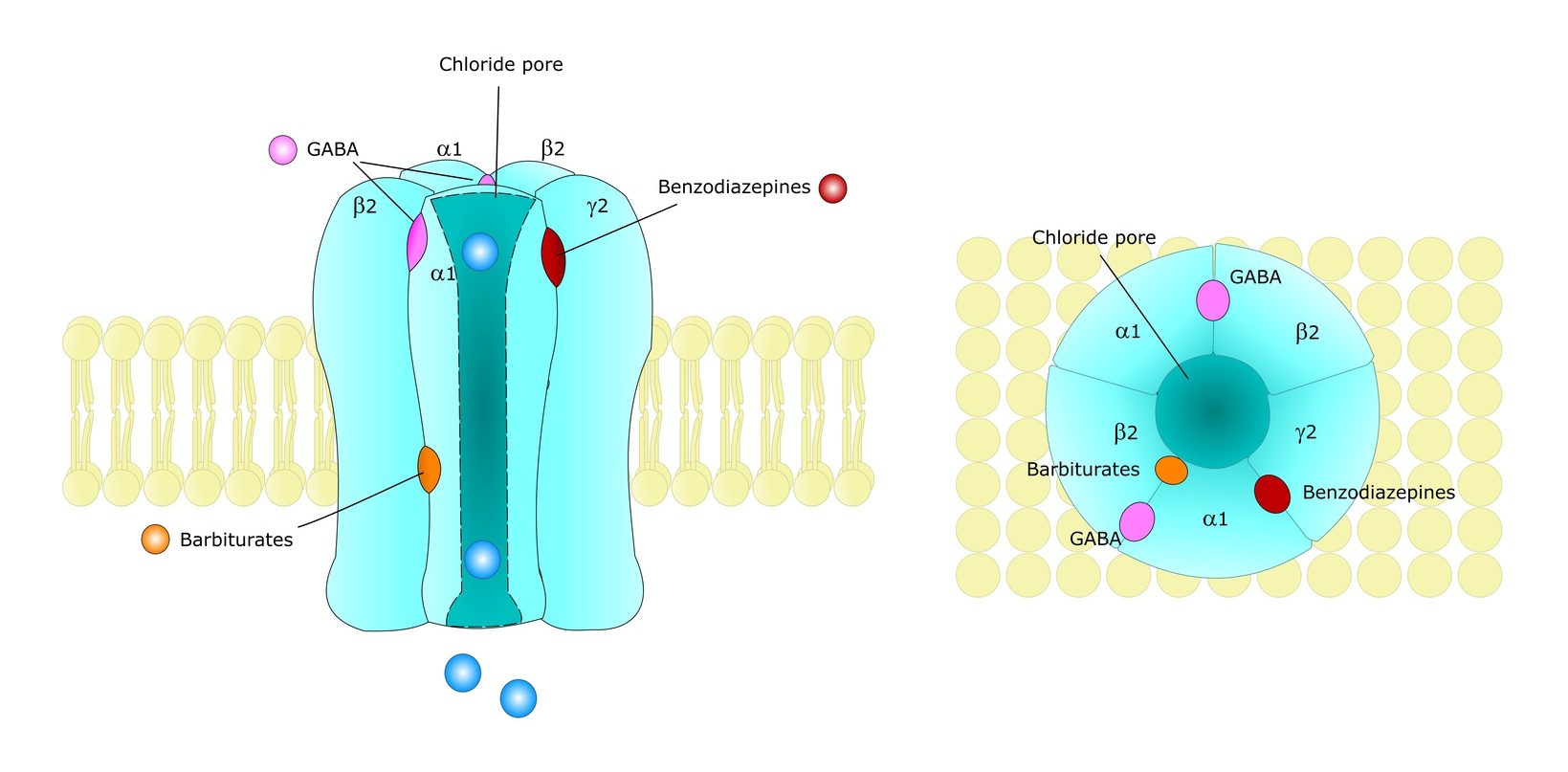
One of the most common causes of anxiety–one that conveniently can be influenced by certain nootropics–is GABA deficiency in the brain. GABA (or Gamma-aminobutyric acid, if you want to sound smarter than you really are) is an important neurotransmitter commonly associated with mood and relaxation regulation. When the brain is in an excess state of excitation (i.e. stress, anxiety), GABA release and uptake seems to even the brain out.
If GABA levels are low, nerve cells may become overstimulated. In turn, the overstimulation may manifest itself as anything from mild worry to sever panic.
Pharmaceutical anxiety medication operate by either stimulating brain GABA levels or enhancing GABA receptor sensitivity.
However, the common problem with the pharmacological approach to reducing anxiety is the cognitive-declining sedative effect that often accompanies, or delivers, the anti-anxiety benefits. Anxiety is decreased, sure. But suddenly the brain has oversteered in the opposite direction: Anxiety, worry, and stress are replaced by apathy, lightheadedness, lack of motivation, etc.
This is where nootropic anti-anxieties have an edge on their pharmaceutical counterparts, given the requirement that nootropics be free of side effects.
How Can Nootropics Help Reduce Anxiety?
Typically, if I’m looking for nootropics that can reduce anxiety, I’m looking for nootropics that engage in one way or another the GABA system. However, this isn’t the only criterion for anxiolytics. There are a few biopathways that nootropics can support to help users manage their anxiety and stress levels, including but not limited to the following:
- Stimulating GABA synthesis and release
- Promoting GABA receptor sensitivity
- Optimizing other mood-related chemicals (e.g. dopamine, serotonin)
- Regulating stress hormone levels (e.g. cortisol, epinephrine)
- Enhancing alpha brainwaves
Some nootropics act directly on the biostructures involved in anxiety, some act indirectly. Others simply help reduce the symptoms, or effects, of anxiety gone awry.
Regardless, there are several nootropics–natural and synthetic–that I recommend for anxiety and stress relief, many of which can be stacked together for enhanced synergy and cognitive coverage. And the best part: These nootropics don’t compromise but rather enhance cognition to decrease anxiety.
Related:
Best Nootropics for Stress
Best Nootropics for Anxiety
I’ve divided the nootropic lists by natural nootropics and synthetic nootropics that may help decrease general (or even acute in certain cases) anxiety. For the most part, the natural nootropics may be stacked, as evidenced by some of the top supplement stacks on the market. The nootropic drugs on the other hand deserve greater caution while supplementing for reasons I’ll accordingly state.
Disclaimer aside, enjoy:
Natural Nootropics for Anxiety
L-Theanine
Drink tea, keep calm, and carry on. Or if you want to get right to it, supplement L-Theanine, the bioactive amino acid nootropic found in green tea that’s responsible for the herb’s “wakeful relaxation” effects. Through enhancing alpha brainwaves, which are associated with creativity, relaxation, and focus (i.e. being “in the zone”), L-Theanine manages to reduce anxiety in a way that doesn’t compromise energy. It’s a non-sedative relaxant, one study describing the mental experience as “relaxed but alert”–particularly during conditions of high anxiety.
This is great news for the coffee lovers, who love the caffeine stimulation but not the anxiety-spiking jitters: L-Theanine stacked with caffeine sustains the stimulation while eliminating the excess energy. More on L-Theanine.
Rhodiola Rosea
The Soviets kept this anti-fatigue adaptogen a secret for decades, but guess what: Cat’s outta the mf bag!! Rhodiola Rosea has hit the mainstream, along with its potent anti-stress adaptogenesis and fatigue resistance.
As an adaptogen, Rhodiola helps the body adapt to all forms of stress: cognitive, emotion, physiological–the result being enhanced mental and physical performance as well as reduced anxiety. On the flipside, if you’re feeling low energy and motivation, Rhodiola also works as a quick, effective pick-me-up.
Sufferers of Generalized Anxiety Disorder (GAD) may particularly benefit by this herb given this preliminary study‘s observations of 340 mg Rhodiola extract decreasing various GAD measures throughout a 10 week trial. More on Rhodiola Rosea.
Bacopa Monnieri
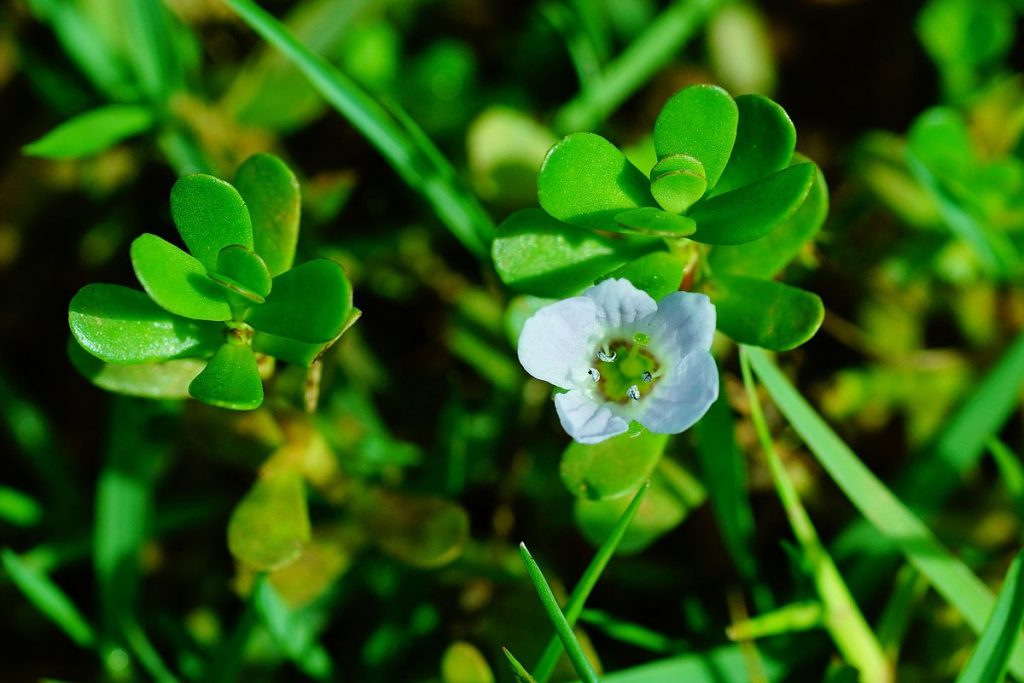
- Animal study – demonstrated anxiety reductions comparable to lorazepam (pharmaceutical anti-anxiety) minus the usual sedative side effects.
- Human study – Bacopa improved “higher order cognitive processes” related to learning and memory, while improving general anxiety status.
Of course, not only academicians may benefit by enhanced learning, memory, and cognition, making Bacopa a high-value nootropic beyond graduation day. More on Bacopa Monnieri.
B Vitamins
Of the B vitamins, Vitamin B6 seems to have the most nootropic “mood elevating” effect–some researchers even describing “high-dose pyridoxine” (pyridoxine = B6) as a bona fide “anti-stress strategy.” Although, when it comes to B vitamins, I have a just-take-all-of-them attitude, because why the heck not?
As you age, B vitamins become of greater and greater import, given their natural gradual decline over time. Even so, taking high doses of B vitamins at times may enhance cognition and focus, particularly as they relate to mood, which is why energy shots (e.g. 5-Hour Energy) and energy drinks are big on these compounds. They simply feel goooooood. More on B Vitamins.
What about Inositol?
Typically classified as Vitamin B8, Inositol is not a true B vitamin, but it does seem to possess significant anti-anxiety effects. Perhaps even more so than the traditional B vitamins, with some research demonstrating clinically viable reductions in anxiety and dysphoria. Not that you have to choose between B vitamins and Inositol–why not take both?
Ashwagandha
The second Ayurveda adaptogen on this list, Ashwagandha is equal parts mental and physical performance enhancer (same as Rhodiola) with a side serving of sexual performance enhancement, if you’re into that kind of thing. Well, technically, even if you’re not into that kind of thing, Ashwagandha still has it.
Due to its sedative effects, Ashwagandha is perhaps best to take later in the day (also perhaps as a chance to take care of its other night-time benefits–*wink wink nudge nudge cough fart*). Although the sedation isn’t so overwhelming that you can’t have a fully functional, or even functionally enhanced, day on the plant. Its increases in memory, improvements on reactions, and boosts on learning should validate long-term supplementation of this herb as well–so regardless of the time of day you take it, if you’re supplementing it daily, you should still receive its long-term anxiolytic benefits. More on Ashwagandha.
Magnesium
Trust me: you need more magnesium in your life. With upwards of 68% of Americans not meeting their daily recommended intake of magnesium, the developed world is alarmingly deficient in this essential mineral. Next to sleep deprivation (linked to excessive blue light exposure in the evening, unhealthy working habits, etc.), magnesium deficiency is likely associated with the rise in mental health disturbances related to depression and anxiety.
This makes sense: as an inhibitory (relaxing) compound throughout the nervous system, magnesium plays a key role in relaxing both mind and body. In the absence of healthy magnesium levels, the nervous system fails to “chill out,” leaving you feeling both mentally drained and on edge at the same time — i.e., anxious. If you don’t believe me that this common mineral can be so effective combatting anxiety, try it out. Take one serving of magnesium L-threonate (Magtein) and report back to me. You’ll be surprised at how immediately effective this nutrient can be at relaxing the mind, allowing you to get better focus and even sleep. More on Magnesium.
Nootropic Drugs for Anxiety
Aniracetam

Word on the street, Aniracetam is up to five times as potent as vanilla Piracetam, yet takes longer to breakdown in the body. Meaning Aniracetam’s effects are more potent and last longer than Piracetam’s, which is groovy because Aniracetam has been linked to a benefit not commonly associated with Piracetam: Decreased anxiety.
It’s how I help myself distinguish Aniracetam from the other racetams: an-iracetam for an-ti-an-xiety. GENIUS, RIGHT?! You’ll have to take the “word on the street” for all of this, though, considering the lack of human trials on the subject. Even so, I find Aniracetam to have more promise than Piracetam. More on Racetams.
What about Noopept?
If Aniracetam doesn’t do it for you, consider supplementing Noopept. Compared to piracetam and aniracetam, Noopept is way more potent, some users even describing a “psychostimulatory” experience with the drug.
Because of the psychostimulation, Noopept deserves the most caution when supplementing. Many cases of Noopept usage report anxiolytic effects following supplementing, however there have also been reported incidents of increased anxiety at higher dosages. Which is sort of, like, COUNTERPRODUCTIVE to the whole decreasing anxiety thing, so let’s not overdo it on this one, mmkay. More on Noopept.
Etifoxine
Often sold as Stresam, Etifoxine is a viable anti-anxiety drug option for its relatively side effect free benzodiazepine-like effects: At worst you may experience slight sedation and drowsiness. For the most part, Etifoxine remains under the radar of the nootropic mainstream, even though the research behind this anxiolytic is generally positive, suggesting even of significant neuroprotective value on “peripheral nerve regeneration and functional recovery.”
I’m somewhat hesitant to include this drug given that it’s rarely discussed, and thus relatively under-explored in terms of long-term toxicity. However, the nootropic potential is undeniably strong and appealing. I give it a deserved “Two Thumbs Up! Great Holiday Fun!” review.
Picamilon
Picamilon, or “Pikamilon” if you want to look like a cool guy, is a lab-derived compound of two natural substances: GABA + Niacin. Independently, the compounds don’t have much of an effect: GABA is unable to cross the blood-brain barrier; Niacin is just a B vitamin. A valuable B vitamin, but a B vitamin all the same. Yet, together they create a unique nootropic effect that both energizes and calms with a lack of major side effects.
Thanks to Niacin’s water-solubility, the vitamin is able to carry the water-insoluble GABA across the blood-brain barrier for GABA to engage the GABA receptors in the brain, signalling for a decrease in stress hormones while promoting the release of dopamine. The Picamilon result being less anxiety and more feel-good focus and energy. More on Picamilon.
Sulbutiamine
Another synthetically bonded compound, except this time between two of the same substance: Vitamin B1 (Thiamine). Anecdotally, Sulbutiamine is prime for the social variety of anxiety as well as any anxiety that impedes work output and performance. Frankly, I can’t imagine there being much of a difference in these “types” of anxieties, but if Sulbutiamine is truly effective at minimizing the social stressors of anxiety, then I’m all for it.
On the whole, research is scarce on this nootropic, with much of its evidence remaining to be translated to English. However, I’m including it for its reputation as a reliable boost on verbal fluidity, a feature typically reduced by anxiety and stress. Even so, I wouldn’t put much faith in Sulbutiamine for serious cases of anxiety. It doesn’t seem to remedy such states, and may actually exacerbate them. More on Sulbutiamine.
Phenibut
We’re slightly departing from nootropic territory here, due to Phenibut‘s insufficient evidence of safety. At lower doses the drug has demonstrated mild side effects: nausea, headache, stomach ache. With some nasty side effects at higher doses: unconsciousness, amnesia, withdrawal. But given the drug’s strong association with decreased anxiety, I felt it relevant enough to add to this list of nootropics.
Phenibut is a Soviet designed GABA derivative, developed to cross the blood-brain barrier for non-sedative anti-anxiety effects á la benzodiazepines. The product proved to be so effective at eliminating short-term acute anxiety that Russian cosmonauts included the drug in their medicine kits to treat stress.
To avoid serious side effects and tolerance issues, I recommend no more than 300 mg doses. Higher doses have been taken for serious cases of anxiety, delivering an experience similar to that of alcohol: dizziness, loss of control. But the body is quick to build a tolerance to Phenibut, so supplement sparingly. More on Phenibut.
Best Nootropic Supplements for Anxiety
I’ve listed the best nootropic ingredients for anxiety. And perhaps you may improve your anxiety levels with a single ingredient, especially if it’s a heavier, sedative-like anxiolytic, such as ashwagandha or even kava kava. But if you want anxiety reduction that also doesn’t impair your mental performance, it’s best to find a supplement stack that mixes anxiolytics with other cognitive enhancers for total brain balance. The best nootropic supplements for anxiety — in my opinion, obviously — include:
Mind Lab Pro
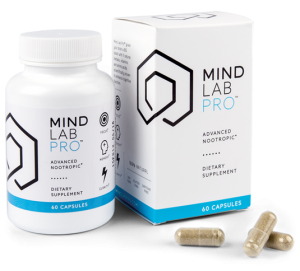 All natural, no synthetics, no stimulants — meaning that Mind Lab Pro supplies nothing that will spike any unnecessary biochemical worry or anxiety. And trust me on that: I’ve seen calm, reasonable friends suddenly lose their minds after a single serving of a highly caffeinated brain booster or fat burner. It’s strange and somewhat unnerving (no pun intended). On the contrary, Mind Lab Pro stacks nootropics that help relax the mind and loosen anxiety with the goals of better cognitive clarity, focus, and attention in mind.
All natural, no synthetics, no stimulants — meaning that Mind Lab Pro supplies nothing that will spike any unnecessary biochemical worry or anxiety. And trust me on that: I’ve seen calm, reasonable friends suddenly lose their minds after a single serving of a highly caffeinated brain booster or fat burner. It’s strange and somewhat unnerving (no pun intended). On the contrary, Mind Lab Pro stacks nootropics that help relax the mind and loosen anxiety with the goals of better cognitive clarity, focus, and attention in mind.
Of the nootropics listed above, Mind Lab Pro supplies L-theanine (with no accompanying caffeine), Rhodiola rosea extract (standardized to a potent extract), Bacopa monnieri (9 bio-actives), and B vitamins (as the premium BioGenesis®) — in addition to other powerful brain boosting compounds and extracts.
Together, these nootropics work well enough at relieving anxiety without compromising brain energy or focus. And the non-stim design of this formula allows Mind Lab Pro users the option to stack it with additional caffeine (e.g., a cup of coffee) or not. (Of course, if you’re a Kierkegaard nerd, you know that more options lead to increased dread and anxiety, so don’t overthink that last part!)
Want some? Get the Best Deal on Mind Lab Pro here.
Read my in-depth review on Mind Lab Pro.
Performance Lab Sleep
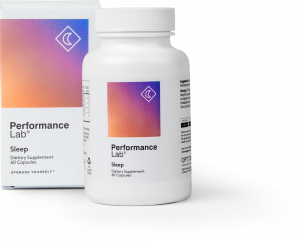 Anxiety and sleep are eternal enemies. Because with anxiety there’s no sleep and with sleep there’s no anxiety. Of course, no one in their right mind would take “anxiety pills” to overcome sleep, so more often than not you’ll find sleep aid supplements to help the anxious relax and, well… sleep. And the supplement I’ve found for the task is Performance Lab Sleep, a natural melatonin* supplement (*naturally sourced from tart cherries) and an all-around high quality mental relaxant.
Anxiety and sleep are eternal enemies. Because with anxiety there’s no sleep and with sleep there’s no anxiety. Of course, no one in their right mind would take “anxiety pills” to overcome sleep, so more often than not you’ll find sleep aid supplements to help the anxious relax and, well… sleep. And the supplement I’ve found for the task is Performance Lab Sleep, a natural melatonin* supplement (*naturally sourced from tart cherries) and an all-around high quality mental relaxant.
How it works: Performance Lab Sleep replenishes the brain with magnesium, a do-all mineral that assists with sleep and cognitive repletion, lulls the brain to rest and relaxation with stable melatonin, and keeps mood levels up throughout the night and next morning with good ol’ L-tryptophan (as TryptoPure®).
The result: Less anxiety for better sleep for a more well-rested, less anxious brain and body. People often recommend to “get better sleep” when you’re feeling off. But if “better sleep” isn’t something you can simply “get”, then first you’ll need to get Performance Lab Sleep.
Want some? Get the Best Deal on Performance Lab Sleep here.
Read my in-depth review on Performance Lab Sleep.
Conclusion
In the same way that Adderall users turn to nootropics for safer cognitive enhancement, I’ve seen many anti-anxiety users consider nootropics for similar reasons. Namely as a means to preserve motivation and clear thinking in the face of reduced stress and anxiety.
I’d caution against this route if you suffer from severe anxiety, as a physician should be consulted first. However, in general the natural nootropics listed above seem like viable options of anxiolysis, regardless of your degree of anxiety. Even so, take the first few doses easy, monitor your body’s reaction, don’t FREAK OUT if you feel no effect because that’d be counterproductive, and take the stack from there.
If nothing else, take the nootropics for the cognitive benefits while doing the whole meditative self-reflection that I mentioned above. Odds are if you’re mentally hung up on something, nootropics won’t help with that anyways. (But they’ll still make you feel gooooood.)
Read my Best Pre-Made Nootropic Supplements list here.

